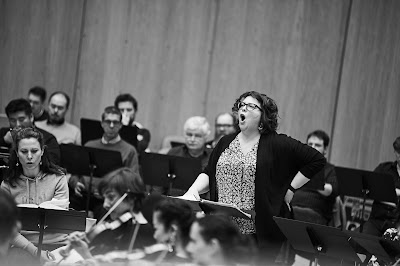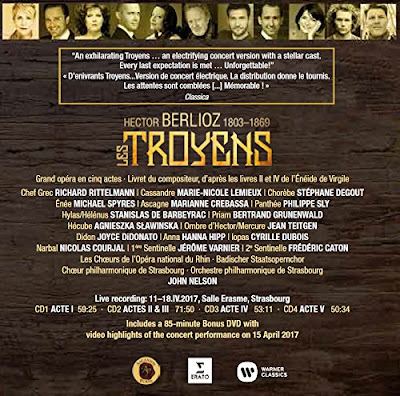Berlioz Les Troyens; Joyce DiDonato, Michael Spyres, Marie-Nicole Lemieux, Orchestre philharmonique de Strasboug, John Nelson; ERATO
Reviewed by Robert Hugill on Nov 29 2017 Star rating:
John Nelson conducts Berlioz opera in live performances with a substantially Francophone cast and a terrific amount of style
British performing groups and Anglo-phone singers have played an important role in the history of Berlioz' Les Troyens from the Glasgow Grand Opera staging in the 1930s conducted by Erik Chisholm, to Sir Thomas Beecham's post-war concert performance (available on disc), the landmark 1950s production at Covent Garden (available on disc), Colin Davis' account of the opera at Covent Garden and on disc for Philips (along with a new critical edition of the opera), and Davis' own second go with the London Symphony Orchestra (available on disc), not to mention John Eliot Gardiner and the Orchestra Revolutionnaire et Romantique's performances at the Chatelet Theatre in Paris in the centenary year with an Italian Cassandre and American Didon and Enée (available on DVD).
The Parisian tradition of performing the work does not seem to have translated into an important post-war recording tradition, and one of the great post-war Didon and Cassandres, Regine Crespin's recording is regrettably only excerpts. All this means that French as she is sung by native speakers has not been terribly important to Les Troyens on disc.
At first sight, this new recording of Les Troyens from Erato is no different, with its American conductor, John Nelson [see my interview with John Nelson], American Didon & Enée, and Canadian Cassandre, especially as this uses a modern instrument orchestra (as compared to John Eliot Gardiner's recording using the original saxhorns for the brass instruments).
Reviewed by Robert Hugill on Nov 29 2017 Star rating:
John Nelson conducts Berlioz opera in live performances with a substantially Francophone cast and a terrific amount of style
British performing groups and Anglo-phone singers have played an important role in the history of Berlioz' Les Troyens from the Glasgow Grand Opera staging in the 1930s conducted by Erik Chisholm, to Sir Thomas Beecham's post-war concert performance (available on disc), the landmark 1950s production at Covent Garden (available on disc), Colin Davis' account of the opera at Covent Garden and on disc for Philips (along with a new critical edition of the opera), and Davis' own second go with the London Symphony Orchestra (available on disc), not to mention John Eliot Gardiner and the Orchestra Revolutionnaire et Romantique's performances at the Chatelet Theatre in Paris in the centenary year with an Italian Cassandre and American Didon and Enée (available on DVD).
The Parisian tradition of performing the work does not seem to have translated into an important post-war recording tradition, and one of the great post-war Didon and Cassandres, Regine Crespin's recording is regrettably only excerpts. All this means that French as she is sung by native speakers has not been terribly important to Les Troyens on disc.
At first sight, this new recording of Les Troyens from Erato is no different, with its American conductor, John Nelson [see my interview with John Nelson], American Didon & Enée, and Canadian Cassandre, especially as this uses a modern instrument orchestra (as compared to John Eliot Gardiner's recording using the original saxhorns for the brass instruments).
 |
| Joyce DiDonato, Michael Spyres, John Nelson rehearsing Les Troyens (Photo Grégory Massat) |
Les Troyens might never have been performed at the Paris opera, but its whole construction and the forces used (four bassoons, six harps, eight horns, nine trombones, six tubas) reflects those available at the Paris Opera, not to mention the libretto's reflection of French Grand Opera, albeit through Berlioz' quirky genius, and the roles of Didon & Enée are in the tradition of those written for Cornélie Falcon and Gilbert Duprez (who sang the title role in Berlioz' Benvenuto Cellini in its abortive Paris Opera performances).
The French slant to the recording is obviously important to conductor John Nelson, his booklet note explicitly mentions the 'mostly French cast, a French orchestra and two French choirs' along with a chorus from Karlsruhe where the opera was first performed complete. (see my interview with John Nelson).
In other respects, this is a very traditional version of the opera, no Sinon scene and Berlioz' revised, compressed ending. The results are very good indeed, and the recording (made at two concerts plus subsequent patch sessions) has a great combination of immediacy and clarity.
 |
| John Nelson, Orchestra philharmonique de Strasboug rehearsing Berlioz:Les Troyens (Photo Grégory Massat) |
When it comes to Joyce DiDonato and Michael Spyres, the word that immediately springs to mind is 'souplesse' (flexibility, suppleness). DiDonato's Didon moves from the commanding to the emotionally wrought whilst Spyres' Enée is lithe and heroic. But it is the suppleness of their line which I came to enjoy, just listen to the beautifully shaped love duet which concludes Act Four.
Joyce DiDonato is fabulous in the way she conveys Didon's welter of emotions, moving from whiplash command to emotional wreck on the turn of a pin, but always within the classicism of Berlioz' writing. Parts of the role might take her to her limits, but she never makes the line bulge or explode, the emotion is writing the music and the ending is heartrending.
Michael Spyres is similarly stylish and he uses his strong technique in a way dramatic tenors in post-Wagnerian accounts of the role are simply unable to do. This is an Enée who conquers not through sheer force but with intelligence and artistry. (In this context, Spyres' recent recital of French music for Opera Rara is extremely illuminating of the music styles out of which Berlioz' Enée arises, see my review). So that 'Inutiles regrets' has a slow build effect which reaches a powerful and moving climax in the subsequent 'Debout, Troyens' scene.
 |
| Marie-Nicole Lemieu rehearsing Berlioz:Les Troyens (Photo Grégory Massat) |
Marie-Nicole Lemieux's duet in Act One with Stéphane Degout displays another of the recording's strengths, the depth of the casting. Stéphane Degout makes a quietly elegant Chorèbe with the duet moving towards desperation without bluster, and both singers reflecting the power of the French language.
Hanna Hipp makes an attractively dark toned Anna, partnering Joyce DiDonato in a touching account of their Act Three duet and forming a definite contrasting foil for Nicolas Courjal's Narbal, Whilst I appreciated Courjal's artistry, dark-tinged voice and characterful performance as Narbal, his voice's vibrato lent a little too much instability to the line for my taste.
The two tenors make a fine contrast to the tradition of English lyric tenors in the roles of Iopas and Hylas. Cyrille Dubois as Iopas sings with finely focussed tone and great style, in a really spine-tingling account of this solo. Stanislas de Barbeyrac is equally fine, in a vibrantly characterful yet lyrical account of Hylas' Act Five solo. Later in that act Jérôme Varnier and Frédéric Caton manage to be both stylish and characterful in the sentinels' duet both singing with distinctly French timbre.
The other smaller roles are finely taken, Marianne Crebassa's bright voiced Ascagne, Jean Teitgen's powerful Mercure (thankfully without extraneous electronic effects) and Philippe Sly's noble Panthée. The small roles of the Ghosts are well taken and wonderfully complemented by Nelson's ear for the striking sonorities in Berlioz's orchestration.
Both the choir and the orchestra are on terrific form, and the orchestra gives finely judged accounts of the many orchestral moments in the opera. The overall sound is lithe, as is appropriate to the recording.
 |
| Berlioz:Les Troyens in concert (Photo Grégory Massat) |
This terrific recording can rightly stand alongside the great performances of the past and really does bring something different to the mix.
Read my interview with John Nelson, talking about his career and inspirations, and recording Les Troyens.
Hector Berlioz (1803-1869) - Les Troyens
Enée - Michael Spyres (tenor)
Chorèbe - Stéphane Degout (baritone)
Panthée - Philippe Sly (bass-baritone)
Narbal - Nicolas Courjal (bass)
Iopas - Cyrille Dubois (tenor)
Ascagne - Marianne Crebassa (mezzo-soprano)
Cassandre - Marie-Nicole Lemieux (contralto)
Didon - Joyce DiDonato (mezzo-soprano)
Anna - Hanna Hipp (mezzo-soprano)
Hylas - Stanislas de Barbeyrac (tenor)
Priam - Bertrand Grunewald (bass)
Soldier, Greek captain - Richard Rittelmann(baritone)
Ghost of Hector - Jean Teitgen (bass)
Helenus - Stanislas de Barbeyrac (tenor)
Sentinel 1 - Jérôme Varnier (bass)
Sentinel 2 - Frédéric Caton (bass)
Mercury - Jean Teitgen (bass)
Hecube - Agnieska Slawinska (soprano)
Les Choeurs de l'Opéra national du Rhin
Badischer Staatsopernchor
Choeur philharmonique de Strasbourg
Orchestre philharmonique de Strasbourg
John Nelson (conductor)
Recorded live at the Salle Erasme, Strasbourg, 15, 17, 18 (patch sessions) April 2017
ERATO 0190295762209 4CDS & 1DVD [59.25, 71.50, 53.11, 50.34, 85:00]
Available on Amazon.
Elsewhere on this blog:
- The greatest opera in the French language: conductor John Nelson on his new recording of Les Troyens - interview
- Contemporary carols in style: Suzi Digby & ORA launch their Advent Calendar - Concert review
- Teenage Mozart: Classical Opera's stylish account of Il sogno di Scipione - CD review
- Gargantuan: Mahler's Symphony No. 3 in Berlin - concert review
- Revolting rhymes & marvellous music: The Magnard Ensemble in Roald Dahl & Paul Patterson - Cd review
- Generously lyrical: A Houseman Dichterliebe from Gareth Brynmor John, Nigel Foster and Gabriel Woolf - concert review
- The man behind the music of War Horse: I chat to composer Adrian Sutton - interview
- Divine consolations: Stile Antico in Schütz and Bach - concert review
- Historical importance: Alamire in new Thomas Tallis discoveries - CD review
- Composers selection: Penderecki conducts Penderecki - CD review
- Home





%20and%20kids.jpg)
.webp)




.jpg)

No comments:
Post a Comment